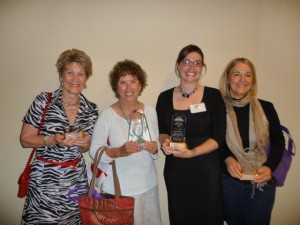
I have completed the first fifteen chapters of my work in progress, THE INTUITIVE, and I now have only three chapters and a short epilogue to go–probably eighty pages or so. It’s an odd point in the process of writing a book, and my guess is it may be the most misunderstood by non-writers. Barring the unforeseen, I should be able to finish the first draft by Labor Day, but right now I know from experience I am at no more than the fifty percent mark on the work.
How can that be? I’m at the eighty percent mark, but only half done? Here’s ten reasons why.
- The last part is the most intense. I have to continue to weave together and differentiate the stories of a dozen or more characters, most of whom are at pivotal moments in their lives. In some ways this writing is easier than the first chapters because I know the characters so much better now. On the other hand, I am so much more invested and that can make some of the writing really painful.
- My protagonist is involved in some new things in the last few chapters, and that means more research to get the facts right. There’s no coasting to the conclusion on settings, events, and situations I’ve already described.
- Writing is like a continuous loop. I reread and revise what I’ve already written more times than I could count. The first two hundred pages of the book are in good shape, the next hundred pretty good but the newly drafted last twenty pages or so will tak almost as much work to revise as to draft. When you work like I do, you don’t worry about the quality or even a lot of the details as you’re drafting, but the time eventually comes to do that. So I have more to do than just those last eighty pages.
- My first and best critic, my sister Lynn, hasn’t weighed in yet, except to say she likes the first twenty pages. No one else has seen it at all. There will be a stage where I make a lot of changes based on early feedback.
- Revising is truly an endless process, until the editor says it’s too late to do any more. The revising now is all on my own initiative to get the book ready to sell, but my agent may want to see some tweaks and the editor may as well. There will be a hiatus between the time it sells and the editor is ready to pay serious attention to it, but once that happens it is back to the drawing board. By that point revision is no fun. I feel done with the book. I am probably writing another. Still, these last flurries of work are part of publication too.
- Writing the book isn’t all the writing in the book. I will need to write an afterword where I “fess up” to any little facts I might have adjusted to fit the story, and provide interesting information that isn’t in the novel. I also will interview myself (yes, most of the author interviews you read in books are done by the author, a discussion guide for book clubs, and anything else that seems like a good idea (glossary, pronunciation guide, timeline, etc.) It is way easier to do this now than later.
- There’s other writing to do too. I write the copy for the book pages on this website, for example, and may need to write out other materials that will be useful when publication nears. As above, everything I can do now, while the book is fresh in my mind, I try to get done immediately.
- As I get close to publication, the writing becomes intense again, because I am sent questionnaires from bloggers or journalists, and get requests for guest posts on blogs. For FINDING EMILIE I did around twenty of these, and each takes several hours.
- When the book comes out, I need to be prepared to talk about it. For now, I just need to work on what people call the “tweet pitch” (describe your book in 140 characters) and the “elevator pitch” (describe your book in thirty seconds or less). Later I will need five minute, twenty minute, forty-five minute, and one hour versions of a “stump speech” about the book. I will also need to come up with variants on demands for audiences interested in specific aspects of the book (suffrage, planned parenthood, unionizing, Ellis Island, intelligence testing, etc.)
- And here’s the biggest reason I’m only half-done: I keep on believing the book can be better. I believe this because it’s true. In every read-through, I see phrasings that could be tightened, details that could be more vivid, important emotional resonance I have missed, characters and settings I’ve lost track of, factual errors I’ve made, and even things as mundane as spacing and typos.
And, might I add, I have other things to do? Most notably, I am headed off tomorrow to spend the weekend with my college roommates in Napa, California. I have been trying not to let more than two weeks pass between posts, so I am writing this instead of packing! At some point this weekend, I’ll raise a glass and toast the beautiful muse who has made my life so interesting and rewarding. For now, I just need to figure out if I need one pair of shorts or two.


